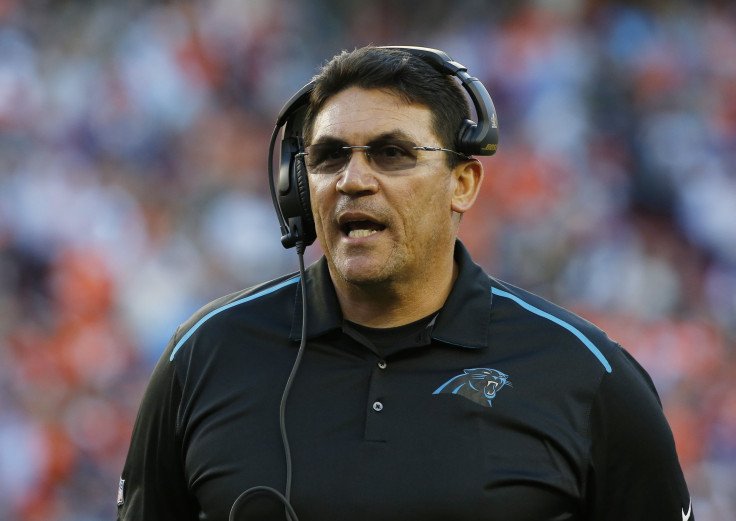NFL Diversity: Minority Coaches Get Fewer Second Chances, Have Difficult Path To Top Jobs, Study Finds

Becoming an NFL head coach can mean traveling a long road. In many cases, a prospect begins as a player, then interns with a team before attempting to climb a challenging coaching ladder to the top position — in that order. But for coaches of color, a more circuitous route to calling the shots on the field frequently includes being diverted from the path that typically leads to a head coaching job, according to a new study provided to International Business Times.
The NFL’s Rooney Rule has long aimed to secure coaching and front-office opportunities for people of color by mandating that teams interview minority candidates. But a diversity and inclusion study performed for the NFL by University of Central Florida (UCF) researchers showed that key pipeline coaching positions that lead to important offensive/defensive coordinator jobs are largely closed to people of color. And if minority candidates do somehow land coordinator jobs — prerequisite positions for head coaches — data in the study show they get less time to prove themselves on the job and fewer second chances than their white counterparts.
“You have to get in the pipeline ... it’s being a quarterbacks coach, it’s being an offensive line coach, they usually go on to become coordinators and usually head coaches when given the opportunity,” C. Keith Harrison, the study’s lead researcher and the associate director of the sports business management graduate program at UCF, told IBT. “The path tends to shift [for] African-American coaches to position coaches that don’t lead to being a coordinator.”

The May 2016 study — the fifth in a series of NFL diversity and inclusion reports dating back to 2013 — looked into occupational mobility for coaching and front-office positions. It also investigated a phenomenon called the “reshuffling effect,” in which fired head coaches and coordinators are regularly cycled back into new key positions with other teams.
To become an NFL head coach, a candidate has to have coordinator experience: Even though there’s no official mandate, it’s seen as necessary preparation. Coaches of color have largely been corralled into positions that don’t lead to that required experience, according to the study. It found that among the 32 offensive coordinators in the NFL as of Feb. 1, 2016, 12 were quarterbacks coaches immediately before assuming their coordinator positions. And, as of the same date, every single quarterbacks coach was white.
Of the 32 running back coaches, 28 were African-American: Just one current offensive coordinator coached running backs immediately prior to taking on his coordinator role. In addition, 14 wide receiver coaches were African-American: Only two current offensive coordinators coached receivers immediately prior to taking on their coordinator roles.
There are similar figures on the defensive side, with an exception for defensive back, or secondary, coaches, which the study called “one of the more viable occupational mobility paths.” Twenty-three of the league’s secondary coaches were African-American. Six of the current defensive coordinators coached defensive backs immediately before landing their new roles, and three of those six are African-American.
The positions African-American coaches frequently earn have little upward mobility, according to the study, which read in part:
“The above data indicate that coaches of color are oftentimes ‘sorted’ and ‘stacked’ into position coach roles such as running backs coaches, wide receivers coaches and defensive line coaches with little prospects of ever earning an opportunity to work as an offensive or defensive coordinator of an NFL team; NFL coordinator experience is essential with respect to NFL head coach prospects.”
The study found that NFL teams hired 49 offensive coordinators and 41 defensive coordinators between the beginning of the 2012 season and Super Bowl 50 this Feb. 7. Just six, or 12 percent, of the offensive coordinators and 14, or 34 percent, of the defensive coordinators were African-American.
To put all these numbers in perspective, six of the NFL’s 32 head coaches, or 18.8 percent, are people of color while about 70 percent of the league’s players are people of color.
Even after people of color land key coaching jobs — as coordinators or head coaches — they’re often given less time to prove themselves and fewer second chances, according to the study.
There’s regular and frenetic turnover among NFL coordinators. For current offensive coordinators, the average time in the position is just 1.3 years; for current defensive coordinators, the comparable figure is 1.6 years. Among African-American coordinators, the average tenure numbers dip to 1 year for the four on the offensive side and 1.1 years for the nine on the defensive side.
And after a minority coach has been fired from a position, data show he is less likely to benefit from the reshuffling system that recently gave Mike Mularkey, who is white, his third head coaching job, this time with the Tennessee Titans.
Between the start of the 2012 regular season and February’s Super Bowl, six white coaches got second chances as head coaches, while just three African-American coaches received the same opportunities. Mularkey and current Denver Broncos coach John Fox, who is also white, were the only coaches during that time frame to get third chances as head coaches.
During that same period, 21 white coaches were afforded second chances at working as offensive or defensive coordinators, according to the study. In contrast, just three men of color got similar second chances in that time frame.
“The findings of this study indicate that, historically, NFL teams have been reluctant to hire a person of color for a head coach, offensive coordinator or defensive coordinator position after a person of color has previously separated from a head coach position in the NFL,” the report read.
Perceived competence and so-called organizational culture affects the career mobility of coaches of color, as well, despite the fact that many minority candidates have gone on to be successful coaches.
Among the 12 playoff teams last year, 25 percent had people of color as head coaches. Sixteen percent had people of color as offensive coordinators, and 33 percent had them as defensive coordinators. Former San Diego Chargers linebacker coach and defensive coordinator Ron Rivera, who is Latino, led the Carolina Panthers to the Super Bowl as head coach last year.
“The challenge is ... men of color, they don’t get recycled and reshuffled at the same rate,” said Harrison, the study’s lead researcher.
© Copyright IBTimes 2024. All rights reserved.






















